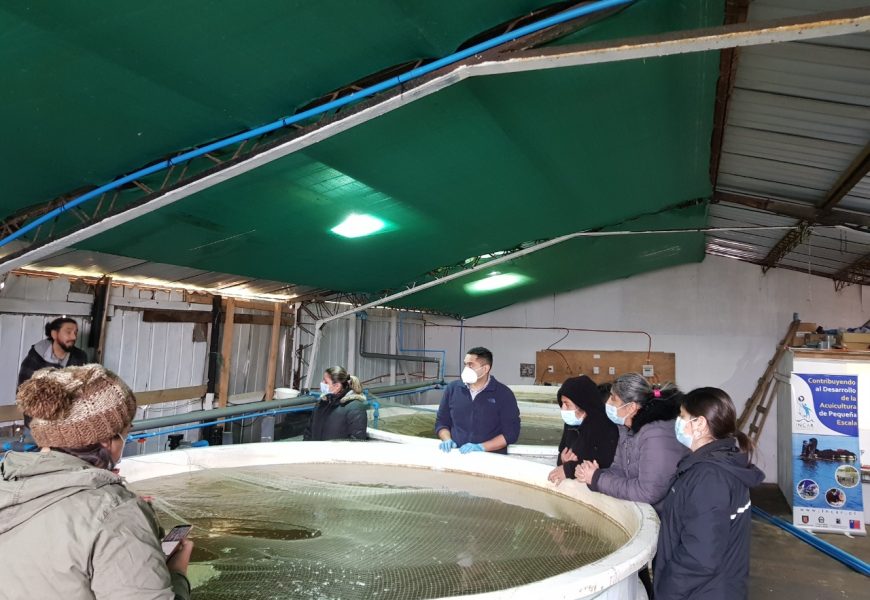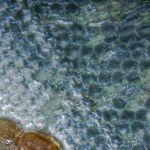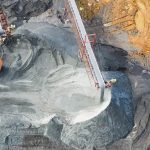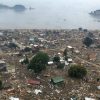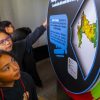From its start, the Interdisciplinary Center for Aquaculture Research, INCAR in Spanish, defined that one of its pillars would be the strengthening of Small Scale Fish Farming (SSFF) in Chile, which many understand as an “artisanal” fishing activity, which does not include a lot of technology in its processes and has small production volumes. At least up until now.
By Edgardo Vera / edgarvera@udec.cl / Photographs: Pablo Carrasco
In 2015, the “Society Liaison” program generated a model that brought together multiple variables to promote sustainable small-scale fish farming, giving the environmental, economic, productive,
social, organizational, sanitary, and legal dimensions the same level of importance. “The model has been able to solve the social and environmental gaps of the communities we work with. It helps to solve the issue of fish farming sustainability, promotes collaboration, fosters networks (increasing social capital), conserves the ecosystems used for SSFF, and helps generate income with an impact on local development. The work includes highly participative co-creation
methodologies with community members or organizations, that takes elements of local ecological knowledge, and allows adapting the SSFF model to each reality”, highlights Pablo Carrasco, head of INCAR’s Society Liaison.
The experience of Cardonal Cove
One of the first experiences associated with the model was the “Sustainable Small Scale Fish Farming Operation along the Forgotten Coastal Areas of the Maule Region”, where the Cardonal Cove Artisanal Fishing Association, with the technical advice of INCAR, designed and implemented an ecological, economic, and socially sustainable Japanese oyster farm in the Chovellén River’s estuary. One of the key milestones for the project’s development and success was the liaison
with strategic actors, who positively affected the development of SSFF in the area. In this way, through a series of activities and meetings, the Council of Pelluhue, together with Cardonal Cove’s
Association, organized the Cardonal Oyster Festival, an event that is now in its 3rd year, and today is acknowledged as one of the events that contribute to local development.
“It must be highlighted that thanks to the project’s coordination and its impact on the community, the Association was invited to take part in the Small Scale Fish Farming Network of the Maule Region, and that after 10 years, on September 9th, 2021, they received their fish farming concession that will let them continue with their small scale farming of oysters and other shellfish”, Carrasco expressed.
Circular Fish Farming at Tubul Cove
The earthquake and tsunami of February 27th, 2010 (known as 27F), hit the Association of Artisanal Fishermen, Seafood Divers, and Algae Collectors of Tubul (A.G de Tubul, in Spanish), who saw how the income of their members dropped drastically, increasing unemployment, and
weakening the historic association of the Chilean gracilaria seaweed collection activity in this Cove.
In this way, in 2016, a pilot fish farming project was implemented, together with the Fishing Administration Fund (FAP, in Spanish) of the Fishing and Fish Farming Undersecretariat (SUBPESCA, in Spanish), based on land-based trout farming. In this context, from 2019, the INCAR Center begins to technically advise A.G. to move forward in this sustainable integrated model for SSFF. Alongside this, the CORFO project “Circular Fish Farming in Tubul Cove” takes place, financed by the former’s “Social Innovation” funding.
“The purpose of the project is to strengthen A.G. Tubul’s trout farming through the participative design and implementation of an integrated sustainable SSFF model, as a contribution to local development, where the region’s social capital is reinforced, female participation is promoted, education is strengthened through the participation of Llico’s secondary school and Tubul’s school, and economic benefits are achieved to make the project sustainable”, Pablo Carrasco explains.
Currently, the project includes a fish farming system and a greenhouse, managed by the members of the Meraki Group, who have been trained to know the critical points of the system and to carry out the corresponding maintenance tasks.
The project, which includes the participation of the National Fishing and Fish Farming Service (Sernapesca), the Agriculture Development Institute (INDAP), the Council of Arauco, the Arauco Province Health Authority, and the Filidor Gaete Fishing School of Llico, is in its final phase, and on October 18th, a ceremony will be held with the participation of all those involved.
Last modified: 29 de agosto de 2025
